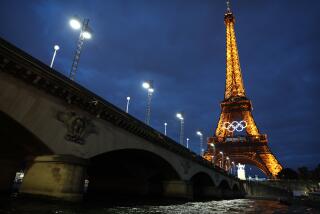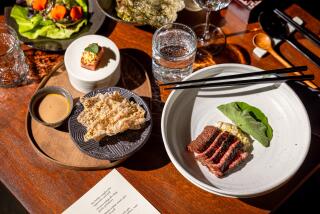Despite the tourists and an abundance of automobiles, Paris remains a stimulating and romantic city
- Share via
I felt I needed more breakfast than cafe au lait and a croissant, so my wife made it a habit, in the mornings, of going into the little market near the hotel and buying me an orange and a banana. Even the French required for this small transaction was beyond my skill.
One morning when she went to the Galeries Lafayette to shop I walked into the Tuileries and sat on a bench to eat my orange and banana. A group of about 30 schoolboys were playing some form of soccer in the gardens. Their game was shrill and chaotic, as schoolboys’ games are the world over, but their schoolmaster seemed to exercise some control over their disorganized energy, shouting out commands now and then in French.
So it was possible to raise children in French. Obviously it was also possible to make love in French (though I have always doubted that one could make love in German.)
The day before, in Rodin’s Museum, we had discovered that the great sculptor was obsessed with lovemaking--not only in his famous sculpture, “The Kiss,” but also in a dozen other sculptures of voluptuous young men and women in amorous embrace. With such an instructor, it was no wonder that we saw young people embracing all over Paris.
Although Paris is overrun by tourists and automobiles, it is still a stimulating and romantic city. But tell me why, when the streets teem with evidently unemployed youths, there are no graffiti. Even in the underground, where hordes wait idly for their trains, entertained by itinerant guitarists, there is not a scratch; the advertising bills in the tunnels are undefiled; at the Louvre station, where full-scale copies of ancient stones and sculptures are on open display, nothing has been defaced; at the station by Rodin’s Museum, copies of the artist’s work are unharmed.
In Paris the tourist makes a game of avoiding his countrymen. It is almost impossible, though, in the little restaurants that spill out on the sidewalks in every block, to escape sitting next to a fellow American. The tables are tiny, and side by side, and it is easy to be blocked in, so you can’t escape.
One evening we chanced into a small cafe off the Rue Saint-Honore and saw that all the tiny tables were taken. But the waiter showed us into a small back room where one long table was set for 10. I sensed at once that if he seated us on the far side, with our backs to the wall, we could soon be penned in, and I would be claustrophobic.
Nevertheless, we sat down, on the far side in the two center seats, and took menus. As I had foreseen, our table was soon filled. A young Frenchman sat on my left, with three friends taking the end and two chairs on the other side. An American couple took the other two seats on the far side. Two men from Chicago took the other end seat and the seat next to my wife. We were trapped. I was uneasy throughout the meal.
The man from Chicago asked my wife, “How did you find out about this restaurant?”
She said we had never heard of it.
“I read about it in the Chicago Tribune,” he said.
Outside the restaurant, after my ordeal was over, a man and woman who had been eating in the other section, at one of the tiny tables, spoke to us. They said they had lived in Paris for several years and had always liked this restaurant; but lately, they suspected, it had been praised in the American press, because suddenly it was overrun with Americans. Like us, the implication was.
Such is the power of the Chicago Tribune.
On our last night in Paris I decided we ought to eat at the Ritz. There are no rules, actually, that bar people of modest means from dining with the upper classes. I put on a tie and jacket and we entered the famous hotel through the Place Vendome, where the Rolls-Royces and Mercedes-Benzes wait with their chauffeurs like patient dogs. We walked through a block-long corridor lined on either side with display windows that showed the chic and glittering wares of all the most expensive shops. It was the sort of goods that do not bear a price tag.
In the bar we ordered a glass of wine and a vodka tonic. A dish of peanuts was on the table and it was soon joined by a dish of excellent almonds, then by a plate of fancy hors d’oeuvres. “This is going to cost us,” I said.
Stylish-looking people were going into the restaurant nearby, and with what I thought was great savoir-faire, I asked our waiter to bring us the menu.
He brought two: one without prices, for the lady. I was not intimidated by the prices. I had decided that we were going to eat at the Ritz, so we could say we had. A hundred years from now what difference would the price make? We had never regretted paying $460 one night for a suite in the Geneva Intercontinental.
Alas, the waiter inquired of the maitre d’hotel and advised us that without reservations we would have to wait at least an hour. We decided we couldn’t wait. The bill for our two drinks was about $15, plus the sort of tip a man of means is expected to leave.
We considered it a bargain. At least we had been to the Ritz.
More to Read
Sign up for The Wild
We’ll help you find the best places to hike, bike and run, as well as the perfect silent spots for meditation and yoga.
You may occasionally receive promotional content from the Los Angeles Times.






